大学英语泛读教程2unit1课文翻译及课后小题
英语泛读教程第二册翻译 Unit 1 the Shadowland of Dream
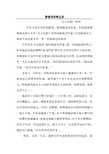
梦想的阴暗之面艾力克斯•哈利许多人怀有美好的愿望,期望能成为作家,但是能够梦想成真的人不多。
艾力克斯•哈利也想成为作家,可是他成功了。
阅读下面这篇文章,看一看他成功的原因。
许多青年人对我说,他们想成为作家。
我一直鼓励这样的人,但是我也向他们解释“成为作家”和写作之间存在着巨大的差别。
多数情况下这些年轻人梦寐以求的是财富与名誉,从未想到要孤身一人长久地坐在打字机旁。
“你们渴望的应该是写作,”我对他们说,“而不应该是当作家。
”事实上,写作是一项孤单寂寞而又收入微薄的工作。
有一个被命运之神垂青的作家,就有成千上万个永远无法实现梦想的人。
即使那些成功人士也经常受到长久的冷落,穷困不堪。
我便是其中之一。
我放弃了在海岸警卫队做了二十年的工作,为的是成为一名自由撰稿人,这时,我根本没有前途可言。
我所拥有的只是一位住在纽约市的朋友,乔治•西姆斯,他和我是在田纳西州的赫宁一起长大的。
乔治为我找了个家,位于格林威治村公寓大楼中的一间腾空的储藏室,而他是那幢大楼的管理员。
房子里冷嗖嗖的,没有卫生间,不过这没什么。
我马上买了一台旧的手动打字机,感觉自己颇象一位名符其实的作家。
然而,大约一年后,我的写作生涯依然没有任何起色,我开始怀疑自己。
卖出一篇小说是如此艰难,以至我几乎填不饱肚子。
但是,我清楚的是我想写作,我已梦寐以求了许多年。
我并不准备成为一名到死时还在想假如的人。
我会坚持把我的梦想付诸实践-- 即使这梦想意味着不稳定的生活和对失败的恐惧。
这是希望的阴暗面,任何心存梦想的人都必须学会在这阴暗面下生存。
后来有一天,我接到了一个电话,由此改变了我的一生。
这并不是一位代理人或编辑打来电话,主动要求与我签大的稿约。
恰恰相反-- 是一声鸣笛,诱使我放弃梦想。
打电话来的是海岸警卫队的老熟人,现在在旧金山。
他曾经借给我几美元,喜欢催我还给他。
“我什么时候才能拿到那十五美元,艾力克斯?”他逗我说。
“等我下一次卖出作品吧。
”“我有个好主意,”他说,“我们这儿需要一位新的公共信息管理员,年薪六千美元。
unit1英语泛读教程第三版第二册第一单元

unit1英语泛读教程第三版第二册第一单元该课件简单明了,帮助学生很好的掌握课文结构,拓展词汇Unit 1 The Shadowland of Dreamsby Alex Haley该课件简单明了,帮助学生很好的掌握课文结构,拓展词汇Outline Preview Questions Background Information Structure Vocabulary Discussion该课件简单明了,帮助学生很好的掌握课文结构,拓展词汇Preview Questions 1. What is your dream? To be more specific, what is your dream career? What is your dream life? 2. What will you do to achieve your dream?该课件简单明了,帮助学生很好的掌握课文结构,拓展词汇Background Information Alex Haley (August 11, 1921 C February 10, 1992) was an American writer. He is best known as the author of Roots: The Saga of an American Family and the coauthor of The Autobiography of Malcolm X.该课件简单明了,帮助学生很好的掌握课文结构,拓展词汇Roots: The Saga of an American Family is a novel written by Alex Haley and first published in 1976. It tells the story of KuntaKinte, an 18th-century African, captured as an adolescent and sold into slavery in the United States, and follows his life and the lives of his alleged descendants in the U.S. down to Haley.该课件简单明了,帮助学生很好的掌握课文结构,拓展词汇The release of the novel, combined with its hugely popular television adaptation, Roots (1977), led to a cultural sensation in the United States. The novel spent weeks on The New York Times Best Seller List, including 22 weeks in that list's top spot.该课件简单明了,帮助学生很好的掌握课文结构,拓展词汇The last seven chapters of the novel were later adapted in the form of a second miniseries, Roots: The Next Generations, in 1979.该课件简单明了,帮助学生很好的掌握课文结构,拓展词汇Structure AnalysisPart One (para. 1-2) : There is a big difference between “being a writer”and writing. Part Two (para. 3-14) : Alex cited himself as a good example to prove that writing career is tough and suffering test. Part Three (para. 15- 18) : As he kept working at his dream, Alex eventually achieved success. Part Four (para. 19-23) : His old possession reminds him of the courage and persistence which help him endure in the shadowland.该课件简单明了,帮助学生很好的掌握课文结构,拓展词汇Vocabulary requite: reward or avenge requite hate with love 以德报怨freelance:self-employed prospect: an expectation, esp. of success in a career该课件简单明了,帮助学生很好的掌握课文结构,拓展词汇superintendent: the caretaker of a building manual: worked by hand manual labour 体力劳动该课件简单明了,帮助学生很好的掌握课文结构,拓展词汇genuine: used to describe people and things that are exactly what they appear to be, and are not false or an imitation refers to things such as emotions that are real and not pretended 该课件简单明了,帮助学生很好的掌握课文结构,拓展词汇tempt: allure or attract acquaintance: a person who knows slightly make one's acquaintance (初次)结识某人make the acquaintance of 初次认识acquaint v. make familiar with 该课件简单明了,帮助学生很好的掌握课文结构,拓展词汇well up : flow or get stronger Anger well up within him.他怒火中烧。
泛读教程第二册课后答案及上课PPTunit1.
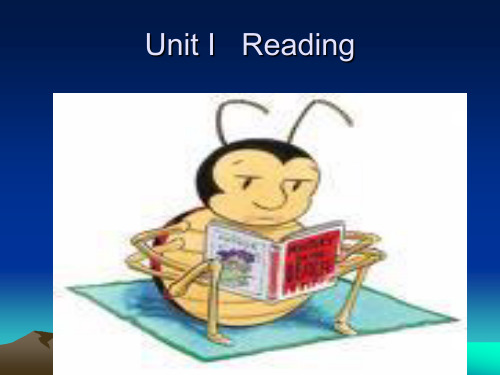
Detailed study of Text A
• Lead-in Question 1. What kind of materials do you always read? Question 2. How do you think of your reading speed? Question 3. What kind of problems do you always encounter while you trying to read faster?
• Besides context clues, semantic relationships are helpful in guessing unknown words
1. Class relationship
Mr. Johnson’s paintings contain circles, squares, triangles, etc.
• The details are the proof or explanation that supports the main idea.
Read the passage on the first page
Questions for discussion: 1. what are the functions of details ? 2. What is a topic sentence? 3. What is the location of the topic sentence?
1st reading of the text
• Do exercises in Reading Comprehension on P. 6.
• Text Analysis
According to the author, how can a person learn to read faster? (Para.1-3)
21世纪大学英语读写教程第二册课文翻译及课后答案
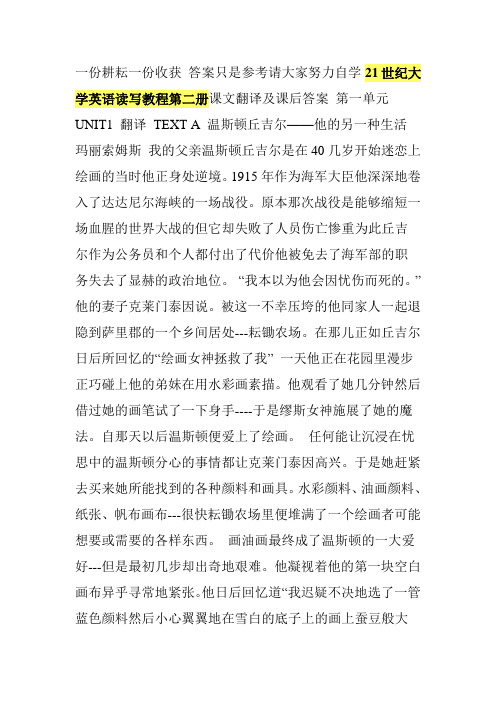
一份耕耘一份收获答案只是参考请大家努力自学21世纪大学英语读写教程第二册课文翻译及课后答案第一单元UNIT1 翻译TEXT A 温斯顿丘吉尔——他的另一种生活玛丽索姆斯我的父亲温斯顿丘吉尔是在40几岁开始迷恋上绘画的当时他正身处逆境。
1915年作为海军大臣他深深地卷入了达达尼尔海峡的一场战役。
原本那次战役是能够缩短一场血腥的世界大战的但它却失败了人员伤亡惨重为此丘吉尔作为公务员和个人都付出了代价他被免去了海军部的职务失去了显赫的政治地位。
“我本以为他会因忧伤而死的。
”他的妻子克莱门泰因说。
被这一不幸压垮的他同家人一起退隐到萨里郡的一个乡间居处---耘锄农场。
在那儿正如丘吉尔日后所回忆的“绘画女神拯救了我” 一天他正在花园里漫步正巧碰上他的弟妹在用水彩画素描。
他观看了她几分钟然后借过她的画笔试了一下身手----于是缪斯女神施展了她的魔法。
自那天以后温斯顿便爱上了绘画。
任何能让沉浸在忧思中的温斯顿分心的事情都让克莱门泰因高兴。
于是她赶紧去买来她所能找到的各种颜料和画具。
水彩颜料、油画颜料、纸张、帆布画布---很快耘锄农场里便堆满了一个绘画者可能想要或需要的各样东西。
画油画最终成了温斯顿的一大爱好---但是最初几步却出奇地艰难。
他凝视着他的第一块空白画布异乎寻常地紧张。
他日后回忆道“我迟疑不决地选了一管蓝色颜料然后小心翼翼地在雪白的底子上的画上蚕豆般大小的一笔。
就在这时我听到车道上传来一辆汽车的声音于是一份耕耘一份收获答案只是参考请大家努力自学惊恐地丢下我的画笔。
当我看清是谁从汽车里走出来时更是惊慌失措。
来者正是住在附近的著名画家约翰莱佛利爵士的妻子。
“…在画画呢‟她大声说道。
…多么有趣。
可你还在等什么呢把画笔给我---大的那支。
‟她猛地用笔蘸起颜料还没等我缓过神来她已经挥笔泼墨在惊恐不已的画布上画下了有力的几道蓝色。
谁都看得出画布无法回击。
我不再迟疑。
我抓起那支最大的画笔迅猛异常地向我可怜的牺牲品扑了过去。
最新泛读教程第二册答案
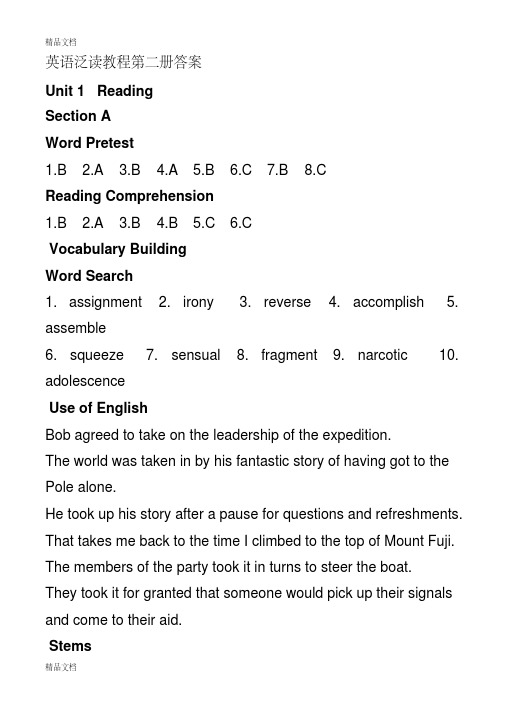
5.
certificate
1. C
2. C
3. B
4. C
5. B
6.
C
7. C
8. A
Reading Comprehension
1. D
2. C
3. C
4. A
5. B
6.
7. A
8. B
Vocabulary Building
Word search
1. lull
2. associate 3. client
4. utterly
精品文档
精品文档
proclaim: to announce officially and publicly; to declare percentage: a proportion or share in relation to a whole; a part confirm: to support or establish the certainty or validity of; to verify affirm: to declare positively or firmly; to maintain to be true centigram: a metric unit of mass equal to one hundredth of a gram exclaim: to express or utter(something) suddenly or vehemently Synonyms 1. adaptability 2. purpose 3.strained 4.hold 5.defeat
Synonyms
1. discriminating 2. widespread 3. compatibility 4.
[精选]大学英语泛读教程2【第二版】UNIT1 课文翻译资料
![[精选]大学英语泛读教程2【第二版】UNIT1 课文翻译资料](https://img.taocdn.com/s3/m/607ae1fd51e79b8968022675.png)
Dreams:making them work for usseveral nights a week Joseph woke up screaming from the same terrible dream.Joseph could never recall his whole dream,though.He only remembered that someone was running after him.Joseph was trying to get away,but in his dream he could not move。
he continued having this nightmare for months。
he was so tired in the morning that it was hard for him to go to work。
Joseph,you see,is not a frightened child,but a grown man。
Milton Kramer is a psychiatrist and dream researcher Cincinnati,Ohio.He believes that it is very important that people don't ignore their dreams,because they are messages from our sleeping minds.When Kramer studied dreams and dreamers,he found that people wake up feeling very discouraged after they have a bad dream.He also found that after having a good dream,people feel more optimistic.Clearly,dreams can have harmful or beneficial effects.As a result,Kramer believes that we need to learn how to change our bad dreams.When we understand what happened in our dreams,we can change negative,hurtful dreams to positive,helpful ones。
泛读教程第二册答案(全)
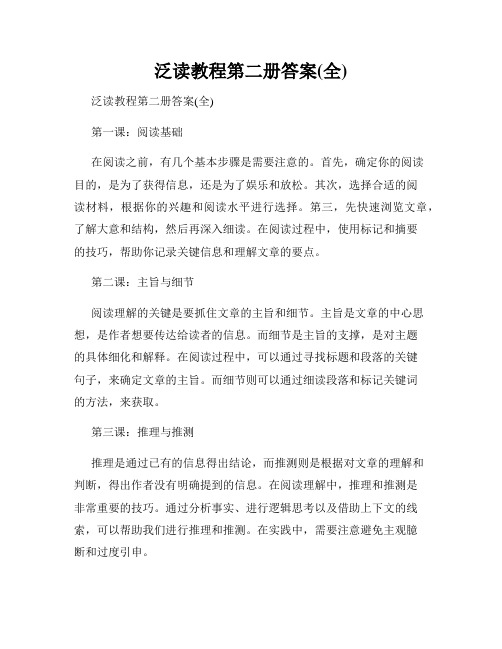
泛读教程第二册答案(全)泛读教程第二册答案(全)第一课:阅读基础在阅读之前,有几个基本步骤是需要注意的。
首先,确定你的阅读目的,是为了获得信息,还是为了娱乐和放松。
其次,选择合适的阅读材料,根据你的兴趣和阅读水平进行选择。
第三,先快速浏览文章,了解大意和结构,然后再深入细读。
在阅读过程中,使用标记和摘要的技巧,帮助你记录关键信息和理解文章的要点。
第二课:主旨与细节阅读理解的关键是要抓住文章的主旨和细节。
主旨是文章的中心思想,是作者想要传达给读者的信息。
而细节是主旨的支撑,是对主题的具体细化和解释。
在阅读过程中,可以通过寻找标题和段落的关键句子,来确定文章的主旨。
而细节则可以通过细读段落和标记关键词的方法,来获取。
第三课:推理与推测推理是通过已有的信息得出结论,而推测则是根据对文章的理解和判断,得出作者没有明确提到的信息。
在阅读理解中,推理和推测是非常重要的技巧。
通过分析事实、进行逻辑思考以及借助上下文的线索,可以帮助我们进行推理和推测。
在实践中,需要注意避免主观臆断和过度引申。
第四课:词汇理解与猜词在阅读理解中,遇到生词或者不熟悉的词汇是常见的情况。
为了更好地理解文章,我们需要学会词汇理解和猜词的技巧。
词汇理解包括通过词根、词缀和上下文的线索来推测词义。
而猜词则是根据语境和逻辑进行推测。
在实践中,我们要注意多读多积累词汇,并善于使用词典和查阅工具。
第五课:推断与态度在阅读理解中,要理解作者的态度和观点是非常重要的。
通过分析文章的词语、语调、结构和上下文的线索,可以推断出作者的态度和观点。
同时,也需要注意区分作者的观点和自己的观点,以免产生混淆。
在实践中,要多阅读不同类型的材料,提高对作者态度和观点的敏感度。
第六课:图表与图像在阅读理解中,遇到图表和图像是常见的情况。
图表和图像可以提供更直观和全面的信息,通过分析图表的标题、标签和数据,可以获取更深入的理解。
同时,也要注意图表和图像与文章的关系,对比与解读。
大学英语泛读第二册unit1课文翻译(精)

在伍斯特理工学院的演讲罗伯特巴拉德或许我受邀演讲的一个原因是,再过几个星期我就五十岁了,但是我对我的将来仍然充满兴奋感,就像三十年前一样。
当时,我大学毕业,准备进入人生一个新的阶段。
对我来说,生活就是一次冒险。
一系列的旅程,一圈圈的环绕。
就像所有伟大的梦想一样,他们都始于一个梦。
当我长大以后,梦想仍然是我生命中的一部分。
每个人都有梦想并努力去使自己的梦想成真。
对我来说,我的梦想就是冒险。
我心目中的英雄是类似于马可波罗,詹姆斯库克船长,和儒勒凡尔纳的小说中那些神话般的人物。
其中一个我欣赏的英雄出自《海底两万里》,包括里面的诺第留斯号核潜艇及尼莫船长。
我最大的梦想就是能建造一艘自己的潜艇然后环游海底世界,成为像尼莫船长那样的人物——能从他的魔力窗户里看到平生未尝见过的事物。
我很幸运拥有这样的梦想。
我的父亲是一名工程师,我的哥哥是一名物理学家。
对他们来说世界充斥着物理定律。
物理定律,多么美妙的一样事物啊。
不管你走到宇宙中的哪个角落它都能适用。
假使你能旅行到我们星系的最远处,发现一个拥有智慧生命的生灵,这些生灵可能从未听说过共产主义或资本主义,律师或政治家,但他们却会懂得物理学的定律。
如果上帝想创造什么定律来引导我们,他也理所当然会包括这个定律在内。
一个像尼莫船长那样伟大的探险家怎么可能会不知道这个主导宇宙的万能定律呢?这个发现对我来说实在太幸运了。
它意味着我的梦想有可能成为现实。
我发现当我尝试去实现我的梦想的时候,我就可以实现。
当我遵循这个物理定律时一切皆有可能。
当它成为可能,梦想就触手可及,就算必须冒很多险进行很多的尝试。
在一次伟大的旅程中,当你拥有了一个梦想,你就会开始为自己准备去实现它。
这都是你们在过去四年中一直做的事。
以我为例,我的旅途是身体力行的。
我觉得自己所做的一切是如此美妙。
我能够远离这个社会去一些更远的地方冒险。
就像伊阿宋智取金羊毛,尤利西斯和他的奥德赛史诗。
当我长大以后,世界板块被极大地开发延伸了,最终定界于天空和海底。
- 1、下载文档前请自行甄别文档内容的完整性,平台不提供额外的编辑、内容补充、找答案等附加服务。
- 2、"仅部分预览"的文档,不可在线预览部分如存在完整性等问题,可反馈申请退款(可完整预览的文档不适用该条件!)。
- 3、如文档侵犯您的权益,请联系客服反馈,我们会尽快为您处理(人工客服工作时间:9:00-18:30)。
大学英语泛读教程2unit1课文翻译及课后小题1.The Pickle JarAs far back as I can remember, the large pickle jar sat on the floor beside the dresser in my parents' bedroom. When he got ready for bed, Dad would empty his pockets and toss his coins into the jar. As a small boy I was always fascinated at the sounds the coins made as they were dropped into the jar. They landed with a merry jingle when the jar was almost empty. Then the tones gradually muted to a dull thud as the jar was filled. I used to squat on the floor in front of the jar and admire the copper and silver circles that glinted like a pirate's treasure when the sun poured through the bedroom window.When the jar was filled, Dad would sit at the kitchen table and roll the coins before taking them to the bank. Taking the coins to the bank was always a big production. Stacked neatly in a small cardboard box, the coins were placed between Dad and me on the seat of his old truck. Each and every time, as we drove to the bank, Dad would look at me hopefully. "Those coins are going to keep you out of the textile mill, son. You're going to do better than me. This old mill town's not going to hold you back." Also, each and every time, as he slid the box of rolled coins across the counter at the bank toward the cashier, he would grin proudly. "These are for my son's college fund. He'll never work at the mill all his life like me."We would always celebrate each deposit by stopping for an ice cream cone. I always got chocolate. Dad always got vanilla. When the clerk at the ice cream parlor handed Dad his change, he would show me the few coins nestled in his palm. "When we get home, we'll start filling the jar again."He always let me drop the first coins into the empty jar. As they rattled around with a brief, happy jingle, we grinned at each other. "You'll get to college on pennies, nickels, dimes and quarters," he said. "But you'll get there. I'll see to that."The years passed, and I finished college and took a job in another town. Once, while visiting my parents, I used the phone in their bedroom, and noticed that the pickle jar was gone. It had served its purpose and had been removed. A lump rose in my throat as I stared at the spot beside the dresser where the jar had always stood. My dad was a man of few words, and never lectured me on the values of determination, perseverance, and faith. The pickle jar had taught me all these virtues far more eloquently than the most flowery of words could have done.When I married, I told my wife Susan about the significant part the lowly pickle jar had played in my life as a boy. In my mind, it defined, more than anything else, how much my dad had loved me. No matter how rough things got at home, Dad continued to doggedly drop his coins into the jar. Even the summer when Dad got laid off from the mill, and Mama had to serve dried beans several times a week, not a single dime was taken from the jar. To the contrary, as Dad looked across the table at me, pouring catsup over my beans to make them more palatable, he became more determined than ever to make a way out for me. "When you finish college, son," he told me, his eyes glistening, "You’ll never have to eat beans again unless you want to." The first Christmas after our daughter Jessica was born, we spent the holiday with my parents. After dinner, Mom and Dad sat next to each other on the sofa, taking turns cuddling their first grandchild. Jessica began to whimper softly, and Susan took her from Dad's arms. "She probably needs to be changed," she said,carrying the baby into my parents' bedroom to diaper her.When Susan came back into the living room, there was a strange mist in her eyes. She handed Jessica back to Dad before taking my hand and quietly leading me into the room."Look," she said softly, her eyes directing me to a spot on the floor beside the dresser. To my amazement, there, as if it had never been removed, stood the old pickle jar, the bottom already covered with coins.I walked over to the pickle jar, dug down into my pocket, and pulled out a fistful of coins. With a gamut of emotions choking me, I dropped the coins into the jar. I looked up and saw that Dad, carrying Jessica, had slipped quietly into the room. Our eyes locked, and I knew he was feeling the same emotions I felt. Neither one of us could speak.Exercises1. Read the following statements and decide whether they are true (T) or false (F) according to the text.1.The sounds which the coins made as they were dropped into the pickle jar greatlyinterested the narrator. ( )2.Before taking them to the bank, the father would ask his son to count the coins.( )3.The Father was a bit ashamed each time he slid the box of rolled coins across thecounter at the bank. ( )4.After each deposit, the narrator would ask his father to buy him a vanilla icecream cone. ( )5.After graduation from college, the narrator worked inanother town. ( )6.The narrator felt that he had learned the values of determination, perseverance andfaith from the pickle jar. ( )7.From what his father did, the narrator could feel his great love for him. ( )8.The narrator and his wife spent the first Christmas after their marriage with hisparents. ( )9.Puzzled by what she saw, the narrator’s wife led him into his parents’ bedroom.( )10.The narrator dropped a fistful of coins into the jar in return for his father’s love forhim. ( )2.Choose the best answer to each of the following questions based on theinformation of the text.1.When the narrator was young, ___________.A)he used to toss all the coins he had into a pickle jarB)he used to like making sounds by dropping coins into a pickle jarC)his father used to save all the coins he hadD)his father used to give him all the coins he had2.By depositing the coins in the bank, the father was determined that ______.A)he would teach his son the virtue of thriftB)he would leave as much money as possible to his sonC)his family would be better off in the futureD)his son would go to college and live a better life3.The narrator felt ______ as he stared at the place where the jar had always stood.A)strangeB)puzzledC)movedD)embarrassed4.It can be inferred from the passage that when the narrator was young, _____.A)his family was very poorB)his father was more determined than his motherC)his mother liked to serve dried beans for the familyD)he did very well in his studies5.The narrator was amazed and moved to find that ________.A)the old pickle jar had never been removedB)his father had never stopped depositing moneyC)the old pickle jar was filled with coinsD)his father had started to save money for his baby daughter咸菜坛子在我的记忆中,那个大泡菜坛子就放在父母卧室梳妆台旁边的地板上。
